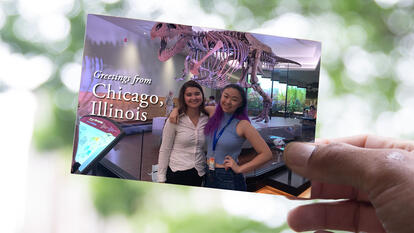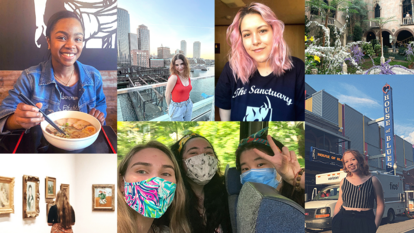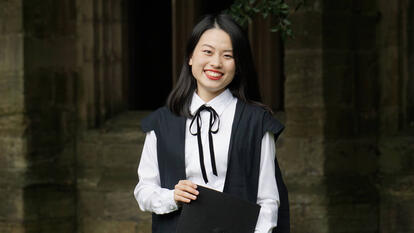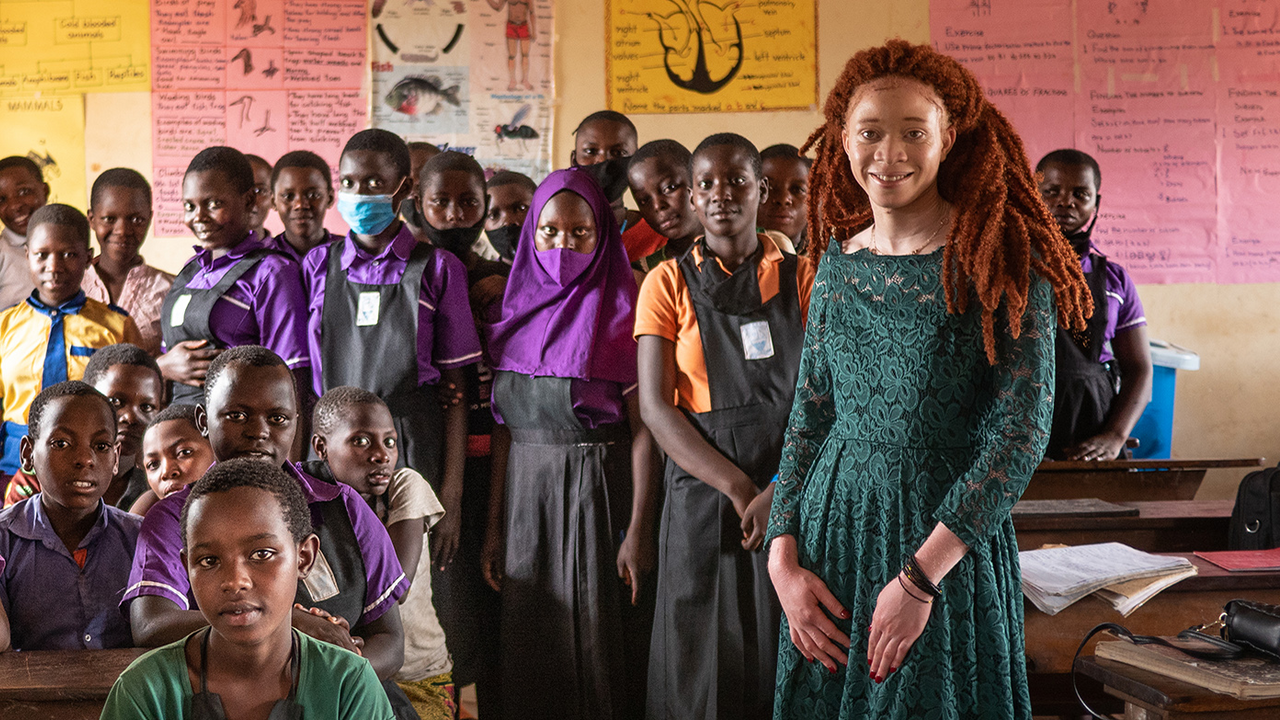
Bringing a Global Perspective to 106 Central Street
“The person I am, that’s a credit to what Wellesley brings to the table. I needed Wellesley to get to this point,” Henrietta Martha ’26 says of her college experience so far.
Wellesley students learn so much on the College’s idyllic campus, but one of the most important lessons is how to improve the world beyond the 02481 ZIP code. Every semester students find ways to engage in global conversations, whether by participating in study abroad programs, taking to the high seas, signing up for the new Civic Action Lab, or following a less-traveled route.
Here are just three examples of incredible Wellesley students who have spent their fall semesters reaching far beyond Wellesley to help people around the world.
FIGHTING FOR CHILDREN’S RIGHTS AND THE ENVIRONMENT
Bach Lam ’27 is a child advisor for the United Nations Committee on the Rights of the Child. In this role, which she took on prior to coming to Wellesley, Lam has helped develop and advocate for General Comment No. 26, “the authoritative guide to 196 States parties on children’s rights and the environment, with a special focus on climate change.” Lam says she and the 11 other child advisors are “the first children established to support the committee to develop the General Comment, including how the committee could meaningfully involve other children and young people in the process.”
In September, Lam attended the official launch of General Comment No. 26 in Geneva, Switzerland. “The one week I spent in Geneva was an incredible, amazing experience I think I won’t ever be able to forget,” she says. “I was so excited to finally meet the other child advisors, the committee, and other key experts after 18 months of working online together. Besides celebrating our hard work, what really was most memorable to me was the sense of community and the bond we shared.”
Lam says she decided to study at Wellesley because it was “the only place that has everything I wanted in a school, from the academics to the community and of course, the beautiful campus!”
Even though Lam had to miss a week of classes in the first month of her first semester of college to attend the launch in Geneva, she was grateful to find her professors were supportive and encouraging of her endeavors. “Wellesley’s faculty are incredible, inside and outside of class!” says Lam.
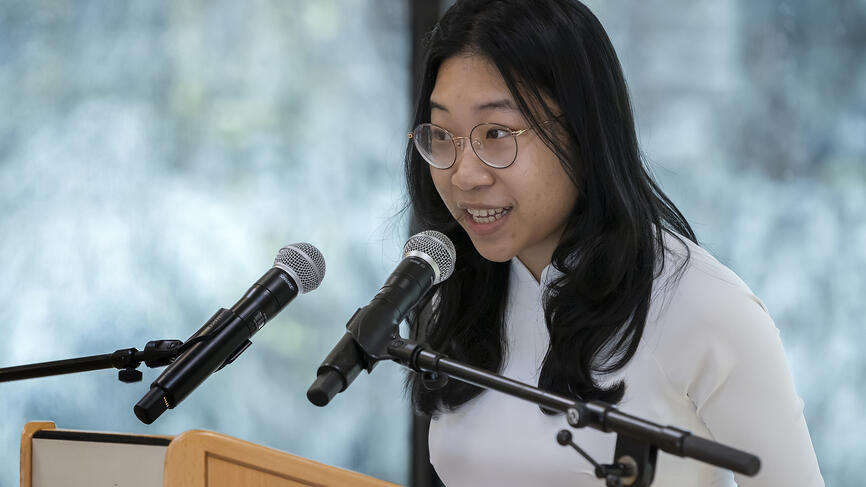
SUPPORTING WOMEN AND PEOPLE OF COLOR IN STEM
Henrietta Martha ’26 is the U.S. coordinator for the UN Climate Change Conference of Youth, which will take place in Dubai in November. The conference is meant to recreate the Conference of the Parties, but with a focus on young people’s voices: “We create documents about what is important to our country, what positions we have, what movements we are seeing,” explains Martha. “I think that’s the best part of the work I’m in. I’m trying to collect resources that we can give to our youth delegates, and a lot of that is focused on positions on climate change and sustainability in the United States.”
In addition to her work for the Conference of Youth, Martha recently returned from Washington, where she attended two events. One was with the UN organization Girl Up, where she connected with women leaders in STEM. “The Girl Up mission is to really look at all the sustainable development goals and provide a lens of gender justice and feminism,” says Martha. The second event was with the Congressional Hispanic Caucus Institute. “It’s a tremendous organization for promoting Hispanic leaders and elected and appointed officials in government,” Martha says. “So it was a great way to connect. I was able to meet the president, vice president, and different members of the cabinet. It was so incredible.”
Martha says she would not be who she is now without her experience at the College. In particular, she says Wellesley helped her find her place in STEM. “I’m someone who, in high school, self-selected out of STEM. I very much felt like I was missing something in STEM. And I was so adamant I would go into humanities,” says Martha. “But then I got to Wellesley, and I took my classes at the Science Center, and I felt in power. And I realized, I’m not missing anything. I have my community, I have my strength.”
EDUCATING REFUGEE GIRLS IN UGANDA
At age 13, Chantale Zuzi ’25 fled to the Rwamwanja Refugee Settlement in Uganda with her nine siblings after her parents were killed in a massacre in her village in the Democratic Republic of Congo. During her time at the settlement, Zuzi was unable to attend school, though with help from the UN Refugee Agency, Zuzi was resettled in Massachusetts.
“The United States provided me with the opportunity to go to high school,” explains Zuzi, “and that made me think about all these young girls who don’t have the opportunity to have an education, and the importance of education and how much it opens doors for me. I wanted to provide that education for young girls.” As a first-year at Wellesley, she launched her own nonprofit, Refugee Can Be, whose mission is to educate and empower refugee girls from the Rwamwanja settlement. Zuzi’s organization created a school for refugee girls outside of the very camp she lived in, where they can live and learn.
Zuzi spoke at the TEDWomen 2023 conference in October about her experience as a refugee, and found herself moved by the contrast of where she had come from with where she is now: “I felt so many emotions. Looking back, where I came from, as a refugee, living in a small refugee camp, and now being in a position where I’m standing on stage, in front of so many people.”
A political science major, Zuzi interned with New York Sen. Kirsten Gillibrand this past summer. “My education here at Wellesley has opened my eyes to a new world,” she says. “Being able to take different classes has also helped shape my approach to Refugee Can Be. I am here at Wellesley because of the generosity of an alum, and the generosity of other people, without whom I never would have been able to make it here. I was given the opportunity to have this education, and I want to use this opportunity to support other girls.”

